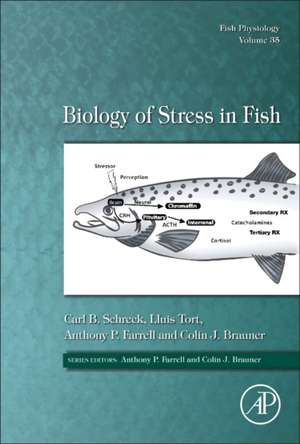Biology of Stress in Fish: Fish Physiology, cartea 35
Autor Carl B. Schreck, Lluis Tort, Anthony Farrell, Colin Brauneren Limba Engleză Hardback – 27 oct 2016
It also considers the biotic and abiotic factors that cause variation in the stress response, how the stress response is generated and controlled, its effect on physiological and organismic function and performance, and applied assessment of stress, animal welfare, and stress as related to model species.
- Provides the definitive reference on stress in fish as written by world-renowned experts in the field
- Includes the most recent advances and up-to-date thinking about the causes of stress in fish, their implications, and how to minimize the negative effects
- Considers the biotic and abiotic factors that cause variation in the stress response
Din seria Fish Physiology
- 14%
 Preț: 659.46 lei
Preț: 659.46 lei - 27%
 Preț: 969.52 lei
Preț: 969.52 lei - 27%
 Preț: 1156.07 lei
Preț: 1156.07 lei - 38%
 Preț: 593.60 lei
Preț: 593.60 lei - 23%
 Preț: 570.59 lei
Preț: 570.59 lei - 8%
 Preț: 483.18 lei
Preț: 483.18 lei - 24%
 Preț: 524.58 lei
Preț: 524.58 lei - 18%
 Preț: 522.69 lei
Preț: 522.69 lei - 23%
 Preț: 498.09 lei
Preț: 498.09 lei - 31%
 Preț: 495.93 lei
Preț: 495.93 lei - 21%
 Preț: 498.47 lei
Preț: 498.47 lei - 17%
 Preț: 497.35 lei
Preț: 497.35 lei - 23%
 Preț: 720.37 lei
Preț: 720.37 lei - 9%
 Preț: 506.27 lei
Preț: 506.27 lei - 11%
 Preț: 665.44 lei
Preț: 665.44 lei
Preț: 562.99 lei
Preț vechi: 618.67 lei
-9% Nou
Puncte Express: 844
Preț estimativ în valută:
107.73€ • 112.78$ • 89.14£
107.73€ • 112.78$ • 89.14£
Carte tipărită la comandă
Livrare economică 29 martie-12 aprilie
Preluare comenzi: 021 569.72.76
Specificații
ISBN-13: 9780128027288
ISBN-10: 0128027282
Pagini: 602
Dimensiuni: 152 x 229 x 35 mm
Greutate: 1.13 kg
Editura: ELSEVIER SCIENCE
Seria Fish Physiology
ISBN-10: 0128027282
Pagini: 602
Dimensiuni: 152 x 229 x 35 mm
Greutate: 1.13 kg
Editura: ELSEVIER SCIENCE
Seria Fish Physiology
Public țintă
Fish physiologists; fish pathologists; fish biologists; professional aquaculturists; ornamental fish managers and hobbyists; researchers of wild, laboratory and aquaculture fish; animal welfare and fish welfare regulatory bodies.Cuprins
1. The Concept of Stress in Fish
2. Variation in the Neuroendocrine Stress Response
3. The Endocrinology of the Stress Response in Fish: An Adaptation-Physiological View
4. The Molecular Stress Response
5. Stress and Growth
6. Homeostatic Responses to Osmotic Stress
7. The Stress and Stress Mitigation Effects of Exercise: Cardiovascular, Metabolic, and Skeletal Muscle Adjustments
8. Reproduction and Development
9. Cognition, Learning, and Behavior
10. Stress and Disease Resistance: Immune System and Immunoendocrine Interactions
11. Stress Indicators in Fish
12. Stress Management and Welfare
13. Stress in Fish as Model Organisms
2. Variation in the Neuroendocrine Stress Response
3. The Endocrinology of the Stress Response in Fish: An Adaptation-Physiological View
4. The Molecular Stress Response
5. Stress and Growth
6. Homeostatic Responses to Osmotic Stress
7. The Stress and Stress Mitigation Effects of Exercise: Cardiovascular, Metabolic, and Skeletal Muscle Adjustments
8. Reproduction and Development
9. Cognition, Learning, and Behavior
10. Stress and Disease Resistance: Immune System and Immunoendocrine Interactions
11. Stress Indicators in Fish
12. Stress Management and Welfare
13. Stress in Fish as Model Organisms






